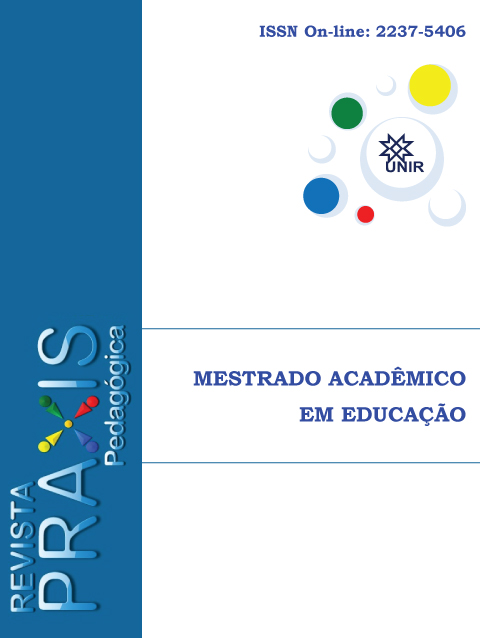THE ACTIVITY PSYCHOPEDAGOGIC IN NON-GOVERNMENTAL ORGANIZATIONS
DOI:
https://doi.org/10.69568/2237-5406.2019v2n3e4201Keywords:
institutional psychopedagogy, psychopedagogic advice, inclusive education, non-formal educationAbstract
This article aims to analyze psychopedagogic activity in Non- Governmental Organizations, in order to search understanding about their role in the context non-formal of learning, without losing sight your ethical commitment front your work object, that is to intervene pedagogically with students who have shown difficulties, problems or global disturbances in development to learn. The fragment of theme is emphasizing the performance of psychopedagogists at the citizenship rescue of subjects in situation of sociocultural vulnerability, into a community little attended by government policies, in a psychic field trip held in the city of Caruaru, state of Pernambuco, in the year of 2018, between the months of June and November, under qualitative analysis with questionnaires semi-structured delivered for forty families, at institutional Starfish (fictitious name). The Psychopedagogy professional performs in these educational space-times the advice focusing on inclusion of these subjects in learning difficulties, in this sense it is possible to recognize the validity of its performance through the evaluation, of diagnosis and interventions that occur with prior planning of activities in this non-formal education spaces as a way of ensuring the right of child learn. Of the forty forms delivered to families, there was devolutive than thirty-five within the time limit set, on the research results were highlighted by the participants the need for improvement in quality of education in form contexts of education, as well as the difficulty from school to manage education processes more inclusive for infants suffering some kind of special need, with emphasis the need for qualified professionals, you can tell the necessity the performance of psychopedagogists in these alternative spaces of non-formal learning, as a way of ensuring the right the learning of learner.
References
ARAÚJO, Priscila M. M.; ROSADO, Adélia C. da S. A importância do profissional de Psicopedagogia na inclusão de crianças autistas na sala de aula. IIICINTEDI. 2017/2018. Disponível em: <http://editorarealize.com.br/revistas/cintedi/trabalhos/TRABALHO_EV110_MD1_ SA6_ID2116_30072018141747.pdf> Acesso em 06 ago. 2019.
BEAUCLAIR, João. Para entender psicopedagogia: perspectivas atuais, desafios futuros. 3. ed. Rio de Janeiro: Ed. Wak, 2009.
BOSSA, Nádia Aparecida. A Psicopedagogia no Brasil: Contribuições a partir da prática. Porto Alegre: Editora Artes Médicas,1994.
COELHO, Simone de Castro Tavares. Terceiro Setor: um estudo comparativo entre Brasil e Estados Unidos. São Paulo: SENAC, 2000.
COSTA, Auredite Cardoso. Avanços da Psicopedagogia em Sergipe. Artigo Especial. 2006. v. 23 ed. 72. Disponível em: <http://www.revistapsicopedagogia.com.br/detalhes/376/avancos-da- psicopedagogia-em-sergipe> Acesso em: 05 ago. 2019.
FERNÁNDEZ, Alícia. A inteligência aprisionada: abordagem psicopedagógica clínica da criança e sua família. Porto Alegre: Artes Médicas, 1990.
FANTOVA, Francesc Marro. O psicopedagogo na área de recursos humanos das organizações. In: IGEA, Benito del Rincón. Presente e futuro do trabalho psicopedagógico. Porto Alegre: Artmed, 2005.
LAKATOS, Eva Maria; MARCONI, Marina de Andrade. Fundamentos de metodologia. 6 ed. São Paulo: Atlas, 2009.
LEONARDI, Gilson. A atuação da psicopedagogia no terceiro setor: Em busca de um espaço amplo de ação em resgate da cidadania. Const. Psicopedag., v.13 n.10, São Paulo 2005. Disponível em: <http://pepsic.bvsalud.org/scielo.php?script=sci_arttext&pid=S1415- 69542005000100008> Acesso em: 02 out. 2018.
PSICOPEDAGOGIA, Associação Brasileira de. Código de ética do psicopedagogo (ABPp). 2013. <http://www.abpp.com.br/documentos_referencias_codigo_etica.html>. Acesso em: 26 set. 2018.
SCOZ, Beatriz Judith Lima (orgs.) et al. Psicopedagogia: o caráter interdisciplinar na formação e atuação profissional. Porto Alegre: Artes Médicas, 1987.
Downloads
Published
Issue
Section
License
Ao submeter um artigo à Revista Praxis Pedagógica e tê-lo aprovado, os autores concordam em ceder, sem remuneração, todos os direitos de primeira publicação e a permissão para que Praxis Pedagógica redistribua esse artigo e seus metadados aos serviços de indexação e referência que seus editores julguem apropriados.


